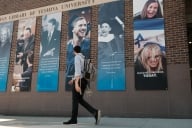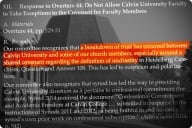You have /5 articles left.
Sign up for a free account or log in.
Four of five students who graduated college in 2008 were able to find some sort of employment in the four years after their graduation, despite entering the work force during the worst of the economic recession, a federal report shows.
Eighty-three percent of bachelor's-degree recipients who were not enrolled in another degree program were employed in some fashion, with about 85 percent of those students working in one full-time job. Eight percent worked in one part-time job, while another 8 percent had multiple jobs.
"This is a snapshot of the depths of the recession," said Anthony Carnevale, director of Georgetown University's Center on Education and the Workforce. "This data comes out of the deepest hole we've had since the Great Depression. They measured the economy when it was near rock bottom. The fact that employment rates were as high as they were is pretty damn good."
The report, compiled by the U.S. Education Department's National Center of Education Statistics and released today, is based on data from the second follow-up of the 2008 "Baccalaureate and Beyond Longitudinal Study." The data reflects the experiences of about 17,110 students. The students who were surveyed attended a mix of public, private, and for-profit four-year institutions.
Four years after graduation, 6 percent of the students were enrolled in another degree program, and 11 percent were employed and enrolled at the same time. Seven percent were unemployed, and 8 percent were out of the labor force and not looking for work.
While not as damaging as it could have been, the recession had a definite impact on the employment of the 2008 graduates, Mark Schneider, president of College Measures, said. But the effect varies substantially depending on the field of study.
"If you do social sciences or the humanities, be prepared for a long haul," Schneider said. "That's the lesson here. That, and these students probably wish they were born in a better time."
Of the students who were employed without being enrolled in another degree program, STEM majors had the easiest time finding a job. The employment rates for students who majored in computer science, engineering, science and mathematics all hovered at or above 80 percent. Engineering had an employment rate of nearly 90 percent.
The non-STEM majors fared less well. Just over 78 percent of students who studied the humanities were employed four years after graduation, and only 74 percent of those students had a full-time job.
If the report had been compiled before the recession, Carnevale said, the patterns for which fields of study are more successful would hold, but the employment numbers would be higher. NCES did in fact compile a version of this report in the decade before the recession, focusing on students who graduated in 1993 and examining their employment experiences in the late 1990s.
The unemployment rate then was 6.4 percent. More than 75 percent of the graduates were fully employed, and 6.7 percent worked a part-time job. Nearly 7 percent were enrolled in another degree program, with just over 11 percent working while enrolled. Nearly 90 percent of the graduates were employed in some fashion four years after graduation.
Richard Vedder, the director of the Center for College Affordability & Productivity, said he's not entirely convinced the recession is to blame for the lower overall employment numbers.
"The numbers are certainly exaggerated as the economy was still recovering in 2012, but I think the numbers really reinforce the notion that the current labor market just isn't overly robust," Vedder said. "Nearly a quarter of the students were not fully employed. The report reaffirms suspicions I had that a large portion of the graduate population is not highly engaged in the labor force."
Because the recession's shadow lingers over the new report, Carnevale said, the timing of the employment numbers is vague enough that the report could provide fodder for both sides of the "Is college worth it?" argument. The real value of the report and others like it, he said, may not be the general employment numbers but the breakdown of specific fields of study.
In the report, the NCES does not attempt to draw any conclusions based on the data, and encourages other researchers to conduct a more in-depth analysis.
"People who talk about whether college does or doesn’t have value, they’re mistaking the forest for the trees," Carnivale said. "You gotta look at the trees. The answer is in the fields of study. Some have better outcomes than others. Some may even have none."








